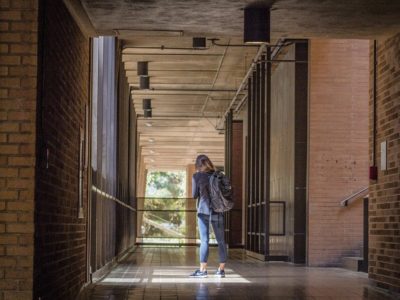The most difficult thing besides doing the work itself is finding a place to do that work. And do it well. Finding the perfect study space can be hard, but it isn’t impossible.The process of doing this may not be the most straightforward, but the results will prove worth it.
Get lost. Bury yourself so totally that the thought of leaving is out of the question.
Have a desk spread with stacks of books, papers and chargers. Colored pens splayed in a rainbow fan. Turn off your phone and tuck it away, deep within your bag, too deep to fuel the urge to peep at its screen.
Especially on the cusp of finals season, finding the study space that allows for pure engagement with your subjects is crucial. Of course, this varies for everybody. The sound levels, how many people pass through and enclosed or open spaces all affect the ideal study space. On a college campus, there is a plethora of locations specifically designed for studying.
The tricky part is learning yourself: understanding what kind of atmosphere best allows for your academic work. Many times this gets confused with a space where you go and work on homework with friends. But I found that studying with friends works for the little assignments, the ones whose content I am familiar with and do not need to re-learn for class. However, when it comes to finals, I can’t study with them all the time. I need to dive in, without anyone around, so that my focus can be totally on the material at hand.
Because I knew myself in this way, I knew the kinds of locations that I needed to look for upon for sitting down and grinding out some homework. The week before finals, I began the search.
I started in the library, because that seemed the most obvious choice. At Boston College, however, there are two standard libraries that the students frequent. I began with one named O’neill. O’neill is the typically library most students choose to do their homework in, on the weekends or on week nights. It has five floors, all with both large tables and small cubicles as study spaces. As the floors increase in height, they decrease in sound level, so much so that the fifth floor is a silent floor. You can’t even eat in the left-wing. Usually this silence frightens me. I could only focus on the loud breathing of the man sitting next to me rather than the math equations on my graph paper below.
This is where I began. The fifth floor, sitting at a table that allowed me to spread. When the silence became oppressive, I moved to the fourth for a brief moment before realizing that if a heavy silence hadn’t worked, maybe a light one wouldn’t really either. The third floor let it happen. With five varying articles in front of me for a research paper I was knee-deep into writing, I got lost.
I wielded my highlighter like a light that would get me through to the other side of a dark forest. I slashed my way through the dense paragraphs and scholarly diction. Pulling quotes, I transformed my essay as my fingers flew across the keyboard below. I returned the next day, hoping to again become so lost. I tried diving into a poetry essay. The poems before me were like patches, each one including elements of language and form that I needed to gather in the proper order so that I could write a cohesive essay about them.
But the lighting.
Something about the way it ricocheted off the bright white paper was different today. I couldn’t easily read the pages, and my ideas were not there. Nothing would come to me. Not standing for it, I commenced the search yet again.
The other library at Boston College is Bapst. This is the older library, designed like a church. The stretch of the nave holds long tables of dark wood. Up above, green lamps hang down delicately at regular intervals. Long, towering stained glass windows line both walls of the nave, letting in a kaleidoscope of natural light as well as the artificial coming from above. Bapst is considered a quiet library. Slightly concerned that I would be pressed by the silence as I was in O’neill, I felt out the atmosphere. Because the ceilings stretched seemingly to infinity, the silence was soft on the ears. I pretended I was in a library from the Victorian Era as a fire burned low in a nearby grate. And with that, the mindset to write about poetry was there. Suddenly the language I needed to write this essay was flowing into me.
Other times, especially on the weekends when I had more time, I would venture into the city of Boston and pay a visit to the Boston Public Library. This space is my favorite yet. Within this one library alone, you can find new modern rooms with red walls and eclectic lamps, older rooms with wooden tables and towering bookshelves with ancient tombs. You can find small rooms with a more private feel or open spaces where the occasional music tune wafts in from the central lobby.
This search of finding the perfect study space started out as a guessing game, and it ended as a more educated one. I came to realize that finding a certain study space, at least for me, depends on my mood and the subject I plan on tackling during that time. Math might require a different location than poetry, literature different than Environmental Transformations. That is just the nature of the beast. Most importantly, it revealed to me that with the changing of subjects comes the changing of mindsets. Nothing is worse than grinding out math homework, to only two minutes later start interpreting literature. Allowing a break between two subjects. Letting your mind prepare itself for the transition is just as key as finding a conducive study space.



















